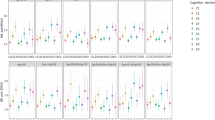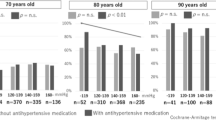Abstract
Previous observational studies on the association between brachial blood pressure (BP) and cognition have reported conflicting results. Central BP has been hypothesized to be more strongly related to cognition than brachial BP. The aim of this study was to assess the association between brachial as well as central BP and cognitive function, both cross-sectionally and with brachial BP measured 17 years before cognitive testing. The study population comprised 2548 individuals aged 61–85 years at follow-up (61.4% women). The cognitive tests administered were A Quick Test of cognitive speed and the Mini Mental State Examination. In fully adjusted linear regressions, small but significant cross-sectional associations were found between higher BP (systolic, diastolic and pulse pressure) and worse results on both of the cognitive tests (P-values <0.05). No significant prospective associations were found. Central BP did not show a stronger association than brachial BP did. After stratification, significant results were mainly found in the group taking BP-lowering drugs at follow-up. In summary, these findings add to existing evidence on the relationship between BP and cognition, but they do not support a superior role of central compared with brachial BP in the elderly.
This is a preview of subscription content, access via your institution
Access options
Subscribe to this journal
Receive 12 digital issues and online access to articles
$119.00 per year
only $9.92 per issue
Buy this article
- Purchase on Springer Link
- Instant access to full article PDF
Prices may be subject to local taxes which are calculated during checkout

Similar content being viewed by others
References
Gorelick PB, Scuteri A, Black SE, Decarli C, Greenberg SM, Iadecola C et al. Vascular contributions to cognitive impairment and dementia: a statement for healthcare professionals from the american heart association/american stroke association. Stroke 2011; 42: 2672–2713.
Skoog I, Lernfelt B, Landahl S, Palmertz B, Andreasson LA, Nilsson L et al. 15-year longitudinal study of blood pressure and dementia. Lancet 1996; 347: 1141–1145.
Qiu C, Winblad B, Fratiglioni L . The age-dependent relation of blood pressure to cognitive function and dementia. Lancet Neurol 2005; 4: 487–499.
Birns J, Kalra L . Cognitive function and hypertension. J Hum Hypertens 2009; 23: 86–96.
McEniery CM, Yasmin, Hall IR, Qasem A, Wilkinson IB, Cockcroft JR et al. Normal vascular aging: differential effects on wave reflection and aortic pulse wave velocity: the Anglo-Cardiff Collaborative Trial (ACCT). J Am Coll Cardiol 2005; 46: 1753–1760.
Izzo JL Jr . Brachial vs. central systolic pressure and pulse wave transmission indicators: a critical analysis. Am J Hypertens 2014; 12: 1433–1442.
Baksi AJ, Treibel TA, Davies JE, Hadjiloizou N, Foale RA, Parker KH et al. A meta-analysis of the mechanism of blood pressure change with aging. J Am Coll Cardiol 2009; 54: 2087–2092.
Williams B, Lacy PS, Thom SM, Cruickshank K, Stanton A, Collier D et al. Differential impact of blood pressure-lowering drugs on central aortic pressure and clinical outcomes: principal results of the Conduit Artery Function Evaluation (CAFE) study. Circulation 2006; 113: 1213–1225.
Roman MJ, Devereux RB, Kizer JR, Lee ET, Galloway JM, Ali T et al. Central pressure more strongly relates to vascular disease and outcome than does brachial pressure: the Strong Heart Study. Hypertension 2007; 50: 197–203.
McEniery CM, Cockcroft JR, Roman MJ, Franklin SS, Wilkinson IB . Central blood pressure: current evidence and clinical importance. Eur Heart J 2014; 35: 1719–1725.
Mitchell GF, Hwang SJ, Vasan RS, Larson MG, Pencina MJ, Hamburg NM et al. Arterial stiffness and cardiovascular events: the Framingham Heart Study. Circulation 2010; 121: 505–511.
Mitchell GF, van Buchem MA, Sigurdsson S, Gotal JD, Jonsdottir MK, Kjartansson O et al. Arterial stiffness, pressure and flow pulsatility and brain structure and function: the age, gene/environment susceptibility—Reykjavik study. Brain 2011; 134: 3398–3407.
Tsao CW, Seshadri S, Beiser AS, Westwood AJ, Decarli C, Au R et al. Relations of arterial stiffness and endothelial function to brain aging in the community. Neurology 2013; 81: 984–991.
Pase MP, Stough C, Grima NA, Harris E, Macpherson H, Scholey AB et al. Blood pressure and cognitive function: the role of central aortic and brachial pressures. Psychol Sci 2013; 24: 2173–2181.
Berglund G, Elmstahl S, Janzon L, Larsson SA . The Malmo Diet and Cancer Study. Design and feasibility. J Intern Med 1993; 233: 45–51.
Nilsson ED, Elmståhl S, Minthon L, Nilsson PM, Pihlsgård M, Tufvesson E et al. Nonlinear association between pulse wave velocity and cognitive function: a population-based study. J Hypertens 2014; 32: 2152–2157.
Zia E, Hedblad B, Pessah-Rasmussen H, Berglund G, Janzon L, Engstrom G . Blood pressure in relation to the incidence of cerebral infarction and intracerebral hemorrhage. Hypertensive hemorrhage: debated nomenclature is still relevant. Stroke 2007; 38: 2681–2685.
Pauca AL, O'Rourke MF, Kon ND . Prospective evaluation of a method for estimating ascending aortic pressure from the radial artery pressure waveform. Hypertension 2001; 38: 932–937.
Folstein MF, Folstein SE, McHugh PR . "Mini-mental state". A practical method for grading the cognitive state of patients for the clinician. J Psychiatr Res 1975; 12: 189–198.
Wiig EH, Nielsen NP, Minthon L, Warkentin S . A Quick Test of Cognitive Speed (AQT). Pearson/Psych Corp.: San Antonio, TX, USA, 2002.
Nielsen NP, Ringstrom R, Wiig EH, Minthon L . Associations between AQT processing speed and neuropsychological tests in neuropsychiatric patients. Am J Alzheimers Dis Other Demen 2007; 22: 202–210.
Takahashi F, Awata S, Sakuma N, Inagaki H, Ijuin M . Reliability and validity of A Quick Test of Cognitive Speed for detecting early-stage dementia in elderly Japanese. Psychogeriatrics 2012; 12: 75–82.
Tzourio C, Laurent S, Debette S . Is hypertension associated with an accelerated aging of the brain? Hypertension 2014; 63: 894–903.
Tsivgoulis G, Alexandrov AV, Wadley VG, Unverzagt FW, Go RC, Moy CS et al. Association of higher diastolic blood pressure levels with cognitive impairment. Neurology 2009; 73: 589–595.
Nilsson SE, Read S, Berg S, Johansson B, Melander A, Lindblad U . Low systolic blood pressure is associated with impaired cognitive function in the oldest old: longitudinal observations in a population-based sample 80 years and older. Aging Clin Exp Res 2007; 19: 41–47.
Farmer ME, White LR, Abbott RD, Kittner SJ, Kaplan E, Wolz MM et al. Blood pressure and cognitive performance. The Framingham Study. Am J Epidemiol 1987; 126: 1103–1114.
Morris MC, Scherr PA, Hebert LE, Bennett DA, Wilson RS, Glynn RJ et al. Association between blood pressure and cognitive function in a biracial community population of older persons. Neuroepidemiology 2002; 21: 123–130.
Singh-Manoux A, Marmot M . High blood pressure was associated with cognitive function in middle-age in the Whitehall II study. J Clin Epidemiol 2005; 58: 1308–1315.
Glynn RJ, Beckett LA, Hebert LE, Morris MC, Scherr PA, Evans DA . Current and remote blood pressure and cognitive decline. JAMA 1999; 281: 438–445.
Taylor C, Tillin T, Chaturvedi N, Dewey M, Ferri CP, Hughes A et al. Midlife hypertensive status and cognitive function 20 years later: the Southall and Brent revisited study. J Am Geriatr Soc 2013; 61: 1489–1498.
Laurent S, Cockcroft J, Van Bortel L, Boutouyrie P, Giannattasio C, Hayoz D et al. Expert consensus document on arterial stiffness: methodological issues and clinical applications. Eur Heart J 2006; 27: 2588–2605.
O'Rourke MF, Safar ME . Relationship between aortic stiffening and microvascular disease in brain and kidney: cause and logic of therapy. Hypertension 2005; 46: 200–204.
Wang SJ, Liao KK, Fuh JL, Lin KN, Wu ZA, Liu CY et al. Cardiovascular autonomic functions in Alzheimer's disease. Age Ageing 1994; 23: 400–404.
Hope SA, Meredith IT, Cameron JD . Arterial transfer functions and the reconstruction of central aortic waveforms: myths, controversies and misconceptions. J Hypertens 2008; 26: 4–7.
Narayan O, Casan J, Szarski M, Dart AM, Meredith IT, Cameron JD . Estimation of central aortic blood pressure: a systematic meta-analysis of available techniques. J Hypertens 2014; 32: 1727–1740.
Acknowledgements
This study was supported by the Research Council of Sweden (grant K2011-65X-20752-04-6), the Anders Pålsson Foundation, the Ernhold Lundström Foundation, the Regional agreement on medical training and clinical research (ALF) between Skåne County Council and Lund University, the Swedish Alzheimer’s Foundation (Alzheimerfonden) as well as grants from Region Skåne.
Author information
Authors and Affiliations
Corresponding author
Ethics declarations
Competing interests
The authors declare no conflict of interest.
Rights and permissions
About this article
Cite this article
Nilsson, E., Elmståhl, S., Minthon, L. et al. Associations of central and brachial blood pressure with cognitive function: a population-based study. J Hum Hypertens 30, 95–99 (2016). https://doi.org/10.1038/jhh.2015.33
Received:
Revised:
Accepted:
Published:
Issue Date:
DOI: https://doi.org/10.1038/jhh.2015.33



